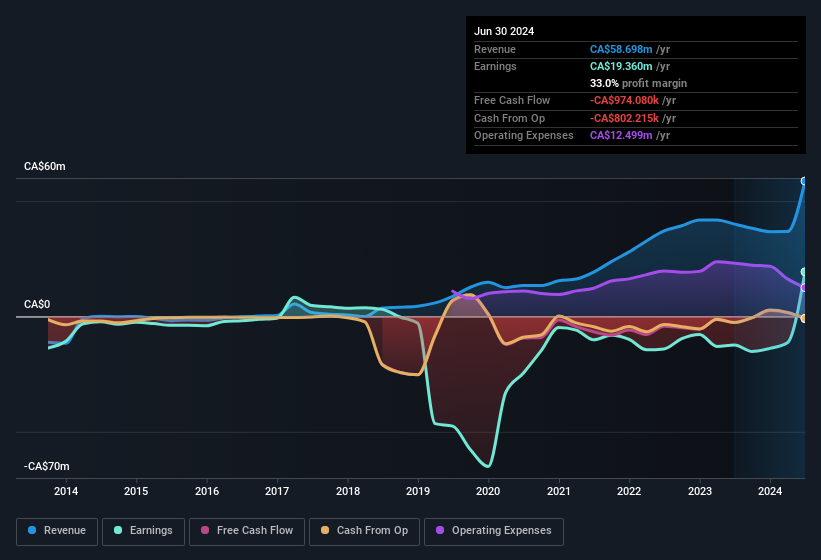Additional Considerations Required While Assessing Captor Capital's (CSE:CPTR) Strong Earnings
Investors were disappointed with Captor Capital Corp.'s (CSE:CPTR) earnings, despite the strong profit numbers. We did some digging and found some worrying underlying problems.
View our latest analysis for Captor Capital

Zooming In On Captor Capital's Earnings
Many investors haven't heard of the accrual ratio from cashflow, but it is actually a useful measure of how well a company's profit is backed up by free cash flow (FCF) during a given period. In plain english, this ratio subtracts FCF from net profit, and divides that number by the company's average operating assets over that period. You could think of the accrual ratio from cashflow as the 'non-FCF profit ratio'.
As a result, a negative accrual ratio is a positive for the company, and a positive accrual ratio is a negative. While having an accrual ratio above zero is of little concern, we do think it's worth noting when a company has a relatively high accrual ratio. To quote a 2014 paper by Lewellen and Resutek, "firms with higher accruals tend to be less profitable in the future".
Captor Capital has an accrual ratio of 1.45 for the year to June 2024. Statistically speaking, that's a real negative for future earnings. To wit, the company did not generate one whit of free cashflow in that time. Over the last year it actually had negative free cash flow of CA$974k, in contrast to the aforementioned profit of CA$19.4m. We also note that Captor Capital's free cash flow was actually negative last year as well, so we could understand if shareholders were bothered by its outflow of CA$974k. However, that's not all there is to consider. We can see that unusual items have impacted its statutory profit, and therefore the accrual ratio. One positive for Captor Capital shareholders is that it's accrual ratio was significantly better last year, providing reason to believe that it may return to stronger cash conversion in the future. As a result, some shareholders may be looking for stronger cash conversion in the current year.
Note: we always recommend investors check balance sheet strength. Click here to be taken to our balance sheet analysis of Captor Capital.
How Do Unusual Items Influence Profit?
Finally, we should also talk about the CA$12m in unusual items that weighed on profit over the year. It's never great to see unusual items costing the company profits, but on the upside, things might improve sooner rather than later. We looked at thousands of listed companies and found that unusual items are very often one-off in nature. And, after all, that's exactly what the accounting terminology implies. Assuming those unusual expenses don't come up again, we'd therefore expect Captor Capital to produce a higher profit next year, all else being equal.
Our Take On Captor Capital's Profit Performance
Captor Capital saw unusual items weigh on its profit, which should have made it easier to show high cash conversion, which it did not do, according to its accrual ratio. Having considered these factors, we don't think Captor Capital's statutory profits give an overly harsh view of the business. If you'd like to know more about Captor Capital as a business, it's important to be aware of any risks it's facing. For example, we've discovered 2 warning signs that you should run your eye over to get a better picture of Captor Capital.
Our examination of Captor Capital has focussed on certain factors that can make its earnings look better than they are. But there are plenty of other ways to inform your opinion of a company. Some people consider a high return on equity to be a good sign of a quality business. While it might take a little research on your behalf, you may find this free collection of companies boasting high return on equity, or this list of stocks with significant insider holdings to be useful.
New: AI Stock Screener & Alerts
Our new AI Stock Screener scans the market every day to uncover opportunities.
• Dividend Powerhouses (3%+ Yield)
• Undervalued Small Caps with Insider Buying
• High growth Tech and AI Companies
Or build your own from over 50 metrics.
Have feedback on this article? Concerned about the content? Get in touch with us directly. Alternatively, email editorial-team (at) simplywallst.com.
This article by Simply Wall St is general in nature. We provide commentary based on historical data and analyst forecasts only using an unbiased methodology and our articles are not intended to be financial advice. It does not constitute a recommendation to buy or sell any stock, and does not take account of your objectives, or your financial situation. We aim to bring you long-term focused analysis driven by fundamental data. Note that our analysis may not factor in the latest price-sensitive company announcements or qualitative material. Simply Wall St has no position in any stocks mentioned.
About CNSX:CPTR
Captor Capital
Engages in the retail sale of cannabis products in the United States.
Excellent balance sheet with low risk.
Market Insights
Weekly Picks


Ferrari's Intrinsic and Historical Valuation


Investment Thesis: Costco Wholesale (COST)

Undervalued Key Player in Magnets/Rare Earth
Recently Updated Narratives

Unique One, Retail Sector, but Short Time Investmentnya Almost 2,5 kali Persediaan


OPAP S.A.: Merger Momentum and Greek Gaming Resilience


A Global Powerhouse in the Making
Popular Narratives


The "Sleeping Giant" Stumbles, Then Wakes Up


NVDA: Expanding AI Demand Will Drive Major Data Center Investments Through 2026

Undervalued Key Player in Magnets/Rare Earth
Trending Discussion







